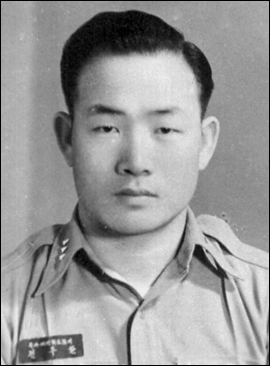|
Democratic Justice Party
The Democratic Justice Party (DJP; ) was the ruling party of South Korea from 1981 to 1990. History Chun Doo-hwan had become the country's de facto leader after leading a military coup in December 1979, and was elected president in his own right in August 1980. Two months after taking office, he abolished all political parties, including Park Chung Hee's Democratic Republican Party, which had ruled the country since 1963, and with few viable constraints on its power since Park's self-coup of 1971. A new Constitution, which inaugurated the Fifth Republic, was enacted later in October. The following January, Chun created the Democratic Justice Party, which garnered the support of most DRP lawmakers and politicians; for all intents and purposes it was the DRP under a new name. He was elected as the first president of the Fifth Republic in 1981. Although the DJP won large majorities at legislative elections in 1981 and 1985 and the system was heavily rigged in its favor, it ... [...More Info...] [...Related Items...] OR: [Wikipedia] [Google] [Baidu] |
Chun Doo-hwan
Chun Doo-hwan (; 18 January 1931 – 23 November 2021) was a South Korean politician, army general and military dictator who served as the fifth president of South Korea from 1980 to 1988. Prior to his accession to the presidency, he was the country's ''de facto'' leader from 1979 to 1980. Chun usurped power after the 1979 Assassination of Park Chung Hee, assassination of president Park Chung Hee, who was himself a military dictator who had ruled since 1961. Chun orchestrated the Coup d'état of December Twelfth, 12 December 1979 military coup, then cemented his military in the Coup d'état of May Seventeenth, 17 May 1980 military coup in which he declared martial law and later set up a Samchung re-education camp, concentration camp for "purificatory education". He established the Fifth Republic of Korea on 3 March 1981. He governed under a constitution somewhat less authoritarianism, authoritarian than Park's Fourth Republic of Korea, Fourth Republic, but still held very broad e ... [...More Info...] [...Related Items...] OR: [Wikipedia] [Google] [Baidu] |
Fifth Republic Of Korea
The Fifth Republic of Korea () was the government of South Korea from February 1981 to February 1988. The Fifth Republic was established in February 1981 by Chun Doo-hwan, a military colleague of long-time president and dictator Park Chung Hee, after the political instability and Military government, military rule in the Fourth Republic of Korea, fourth republic since the Assassination of Park Chung Hee, assassination of Park in October 1979. The Fifth Republic was ruled by Chun and the Democratic Justice Party as a ''de facto'' dictatorship and one-party state. The Fifth Republic faced growing opposition from the democratization movement of the Gwangju Uprising, and the June Democracy Movement of 1987 resulted in the election of Roh Tae-woo in the 1987 South Korean presidential election, December 1987 presidential election. Three days after the election upon the adoption of a new constitution that laid the foundations for the relatively stable democratic system of the current His ... [...More Info...] [...Related Items...] OR: [Wikipedia] [Google] [Baidu] |
1987 South Korean Presidential Election
Presidential elections were held in South Korea on 16 December 1987. They marked the establishment of the Sixth Republic, as well as the end of the authoritarian rule that had prevailed in the country for all but one year since its founding in 1948. They were the first direct presidential elections since 1971, as presidents had been indirectly elected by an electoral college dominated by the governing party in the intervening period. The elections took place following a series of protests and before the 1988 Summer Olympics, which would be held in Seoul. Roh Tae-woo of the governing Democratic Justice Party won the elections with 37% of the vote. The two major opposition candidates, Kim Young-sam and Kim Dae-jung, received over 55% of the vote between them. Voter turnout was 89%. Background The elections were held following a series of nationwide protests for free and fair elections and civil liberties. This period from 10 to 29 June became known as the June Struggle, and p ... [...More Info...] [...Related Items...] OR: [Wikipedia] [Google] [Baidu] |
Social Justice
Social justice is justice in relation to the distribution of wealth, opportunities, and privileges within a society where individuals' rights are recognized and protected. In Western and Asian cultures, the concept of social justice has often referred to the process of ensuring that individuals fulfill their societal roles and receive their due from society. In the current movements for social justice, the emphasis has been on the breaking of barriers for social mobility, the creation of safety nets, and economic justice. Social justice assigns rights and duties in the institutions of society, which enables people to receive the basic benefits and burdens of cooperation. The relevant institutions often include taxation, social insurance, public health, public school, public services, labor law and regulation of markets, to ensure distribution of wealth, and equal opportunity. Modernist interpretations that relate justice to a reciprocal relationship to society a ... [...More Info...] [...Related Items...] OR: [Wikipedia] [Google] [Baidu] |
Anti-communism
Anti-communism is Political movement, political and Ideology, ideological opposition to communism, communist beliefs, groups, and individuals. Organized anti-communism developed after the 1917 October Revolution in Russia, and it reached global dimensions during the Cold War, when the United States and the Soviet Union engaged in an intense rivalry. Anti-communism has been an element of many movements and different political positions across the political spectrum, including anarchism, centrism, conservatism, fascism, liberalism, nationalism, social democracy, socialism, leftism, and libertarianism, as well as broad movements #Evasion of censorship, resisting communist governance. Anti-communism has also been expressed by #Religions, several religious groups, and in art and #Literature, literature. The first organization which was specifically dedicated to opposing communism was the Russian White movement, which fought in the Russian Civil War starting in 1918 against the recent ... [...More Info...] [...Related Items...] OR: [Wikipedia] [Google] [Baidu] |
Economic Liberalization
Economic liberalization, or economic liberalisation, is the lessening of government regulations and restrictions in an economy in exchange for greater participation by private entities. In politics, the doctrine is associated with classical liberalism and neoliberalism. Liberalization in short is "the removal of controls" to encourage economic development. Many countries have pursued and followed the path of economic liberalization in the 1980s, 1990s and in the 21st century, with the stated goal of maintaining or increasing their competitiveness as business environments. Liberalization policies may or often include the partial or complete privatization of government institutions and state-owned assets, greater labour market flexibility, lower tax rates for businesses, less restrictions on both domestic and foreign capital, open markets, etc. In support of liberalization, former British prime minister Tony Blair wrote: "Success will go to those companies and countries which are ... [...More Info...] [...Related Items...] OR: [Wikipedia] [Google] [Baidu] |
Neoliberalism
Neoliberalism is a political and economic ideology that advocates for free-market capitalism, which became dominant in policy-making from the late 20th century onward. The term has multiple, competing definitions, and is most often used pejoratively. In scholarly use, the term is often left undefined or used to describe a multitude of phenomena. However, it is primarily employed to delineate the societal transformation resulting from market-based reforms. Neoliberalism originated among European liberal scholars during the 1930s. It emerged as a response to the perceived decline in popularity of classical liberalism, which was seen as giving way to a social liberal desire to control markets. This shift in thinking was shaped by the Great Depression and manifested in policies designed to counter the volatility of free markets. One motivation for the development of policies designed to mitigate the volatility of capitalist free markets was a desire to avoid repeating the eco ... [...More Info...] [...Related Items...] OR: [Wikipedia] [Google] [Baidu] |
Market Liberalism
Market liberalism is used in two distinct ways. In the United States, the term is used as a synonym to classical liberalism. In this sense, market liberalism depicts a political ideology, combining a market economy with personal liberty and human rights in contrast to social liberalism, which combines personal liberty and human rights along with a mixed economy and welfare state. In Europe and elsewhere, the term ''market liberalism'' is often used as a synonym to economic liberalism, depicting a policy supporting the economic aspects of liberalism, without necessarily including the political aspects of liberalism. In some political spheres, market liberalism refers to an economically liberal society that also provides a minimal to moderate-sized welfare state for its citizens. [...More Info...] [...Related Items...] OR: [Wikipedia] [Google] [Baidu] |
Developmental State
Developmental state, hard state, State-led developmentalism or in some cases Neo-developmental state, is a term used by international political economy scholars to refer to the phenomenon of state-led macroeconomic planning in East Asia in the late 20th century. In this model of capitalism (sometimes referred to as state-development capitalism), the state has more independent, or autonomous, political power, as well as more control over the economy. A developmental state is characterized by having strong state intervention, as well as extensive regulation and planning. The term has subsequently been used to describe countries outside East Asia that satisfy the criteria of a developmental state. The developmental state is sometimes contrasted with a predatory state or weak state. The first person to seriously conceptualize the developmental state was Chalmers Johnson.Leftwich, Adrian, "Bringing politics back in: Towards a model of the developmental state", ''Journal of Developme ... [...More Info...] [...Related Items...] OR: [Wikipedia] [Google] [Baidu] |
National Conservatism
National conservatism is a nationalist variant of conservatism that concentrates on upholding national and cultural identity, communitarianism and the public role of religion. It shares aspects of traditionalist conservatism and social conservatism, while departing from economic liberalism and libertarianism, as well as taking a more pragmatic approach to regulatory economics and protectionism. It opposes the basic precepts of enlightenment liberalism such as individualism and the universality of human rights, and in America and Europe is majoritarian populist. National conservatives usually combine conservatism with nationalist stances, emphasizing cultural conservatism, family values and opposition to illegal immigration or opposition to immigration per se. National conservative parties often have roots in environments with a rural, traditionalist or peripheral basis, contrasting with the more urban support base of liberal conservative parties. In Europe, national co ... [...More Info...] [...Related Items...] OR: [Wikipedia] [Google] [Baidu] |
Kim Jong-pil
Kim Jong-pil (; January 7, 1926 – June 23, 2018), also known colloquially as JP, was a South Korean politician and the founder/first director of the Korean Central Intelligence Agency (KCIA, now the National Intelligence Service (South Korea), National Intelligence Service). He served as Prime Minister of South Korea, prime minister twice, from 1971 to 1975 during the presidency of Park Chung Hee (1961–1979) and from 1998 to 2000 during the presidency of Kim Dae-jung (1998–2003). He was a nine-term National Assembly (South Korea), National Assembly member. Park Chung Hee was his uncle-in-law, as JP married Park's niece, Park Young-ok. Early life Kim Jong-pil was born in Buyeo County, South Chungcheong Province. He initially attended Seoul National University's College of Education but graduated from the Korea Military Academy (KMA) in 1949 (8th graduating class). From September 1951 to March 1952, he studied at the U.S. Infantry School at Fort Benning, Georgia. He p ... [...More Info...] [...Related Items...] OR: [Wikipedia] [Google] [Baidu] |




